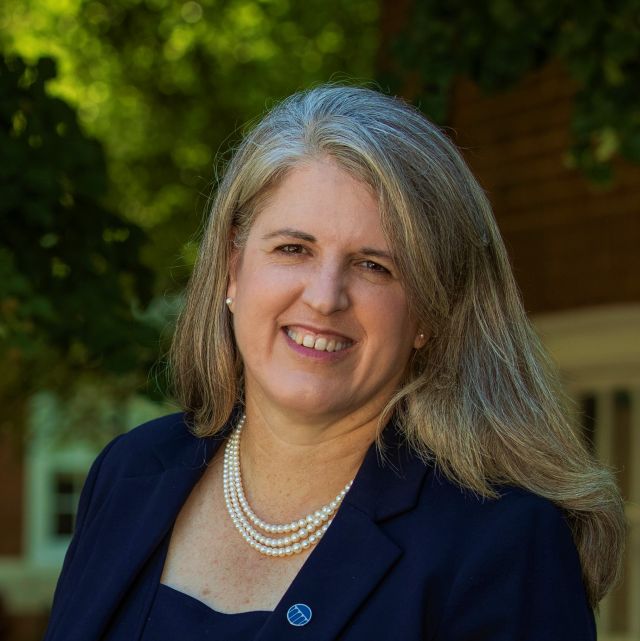Jennifer L. West, Ph.D. Dean of Engineering and Applied Science University of Virginia, National Academy of Engineering, National Academy of Inventors Title: Nanotechnologies for Cancer Diagnostics and Therapeutics

CBE SEMINAR (Zoom)
This CBE Seminar will be hosted in person as well as online via Zoom. RSVP to receive the zoom link by emailing info@bioengineering.ucsb.edu.
Zoom will open after the host has joined at the start of each seminar. You can ask questions through the chat forum and by raising your "hand" and the speaker will call on you.
Speaker
Jennifer L. West, Ph.D.
Dean of Engineering and Applied Science
University of Virginia
National Academy of Engineering, National Academy of Inventors
Faculty Host
Arnab Mukherjee
11:00 am in Bldg. ESB Room #2001
Title: Nanotechnologies for Cancer Diagnostics and Therapeutics
Abstract
The increasing capability to manipulate matter at the nanoscale is generating new materials with unique properties that promise to address unmet medical needs for future generations. As an example, metal nanoshells are nanoparticles with highly tunable optical properties. Metal nanoshells consist of a dielectric core nanoparticle such as silica surrounded by an ultrathin metal shell, usually composed of gold for biomedical applications. Depending on the size and composition of each layer of the nanoshell, particles can be designed to either absorb or scatter light over much of the visible and infrared regions of the electromagnetic spectrum, including the near infrared region where penetration of light through tissue is maximal. These particles are also easily conjugated to antibodies and other biomolecules for molecular targeting. One can envision a myriad of potential applications of such tunable particles. Several potential biomedical applications are under development, including immunoassays, modulated drug delivery, photothermal cancer therapy, and imaging contrast agents. For example, in photothermal cancer therapy, nanoshells can be injected intravenously, accumulate at tumor sites due to the EPR effect and/or molecular targeting, then generate heat upon illumination with near infrared light, leading to destruction of the tumor. This has shown very promising results in a mouse colon carcinoma model, with 100% survival of nanoshell treated mice at 1 year. These materials are now in human clinical trials, demonstrating high efficacy without clinically significant side effects or adverse events. Furthermore, integrated imaging and therapy applications have been accomplished with nanoshells designed to provide both absorption and scattering, potentially enabling "see-and-treat" approaches to cancer therapy.
BIO
Jennifer West joined UVA as Dean of Engineering and Applied Science in July 2021. Prior to this, she had been on the faculty at Duke since 2012, after having been the department chair and Cameron Professor of Bioengineering Rice University. Professor West was one of the founding members of Rice’s Department of Bioengineering, building it to a top ten program over the prior sixteen years. Dr. West became the Associate Dean for Doctoral Education in the Pratt School of Engineering at Duke in 2014. In 2019, the Duke Graduate School honored her with the Dean’s Graduate Mentoring Award.
Professor West’s research focuses on the development of novel biofunctional materials. Part of her program has developed nanoparticle-based approaches to biophotonics therapeutics and diagnostics. An example of this work is the application of near-infrared absorbing nanoparticles for photothermal tumor ablation. In animal studies, this therapeutic strategy has demonstrated very high efficacy with minimal side effects or damage to surrounding normal tissues. Professor West founded Nanospectra Biosciences, Inc. to commercialize the nanoparticle-assisted photothermal ablation technology, now called AuroLase. Nanospectra Biosciences, Inc., located in Houston, TX, is the recipient of a NIST ATP Award and a grant from the Texas Emerging Technology Fund. Professor West is a director of the company. The company has built manufacturing facilities, and AuroLase cancer therapy is now in human clinical trials.
Professor West has received numerous accolades for her work. In 2017, she was elected to the National Academy of Inventors. In 2016, she was elected to the National Academy of Engineering. In 2015, she received the Society for Biomaterials Clemson Award. In 2014, she was recognized by Thomson Reuters as a Highly Cited Researcher, the top 1% in the field of materials science. In 2010 she was named Texas Inventor of the Year and also Admiral of the Texas Navy (highest honor the governor of Texas can bestow on a civilian). In 2008, The Academy of Medicine, Engineering and Science of Texas honored her with the O’Donnell Prize in Engineering as the top engineer in the state. In 2006, she was named one of 20 Howard Hughes Medical Institute Professors, recognizing integration of world class research and teaching. She has been listed by MIT Technology Review as one of the 100 most innovative young scientists and engineers worldwide. Other recognitions include the Christopher Columbus Foundation Frank Annunzio Award for scientific innovation, Nanotechnology Now’s Best Discovery of 2003, Small Times Magazine’s Researchers of the Year in 2004, and the Society for Biomaterials Outstanding Young Investigator Award.
Professor West has authored more than 200 research articles. She also holds 18 patents that have been licensed to eight different companies. She has lectured at numerous institutions, including Harvard, Harvard Medical School, MIT, FDA, and NCI. She was an invited speaker at the 2006 Nobel Symposium and invited back in 2014 for the 50th Anniversary Nobel Symposium.
Professor West has served as a member of the CSR Council and the Bioengineering, Technology, and Surgical Sciences study section at NIH, and has served on numerous other review boards for NIH and NSF. She has also been a member of the Defense Sciences Study Group, a member of the NRC panel on management of university intellectual property, and a member of the AAMC panel on research. She has served as Chair of the College of Fellows of the American Institute for Medical and Biological Engineering and treasurer for the Biomedical Engineering Society. Her laboratory has received funding from NIH, NSF, Howard Hughes Medical Institute, and DOD.